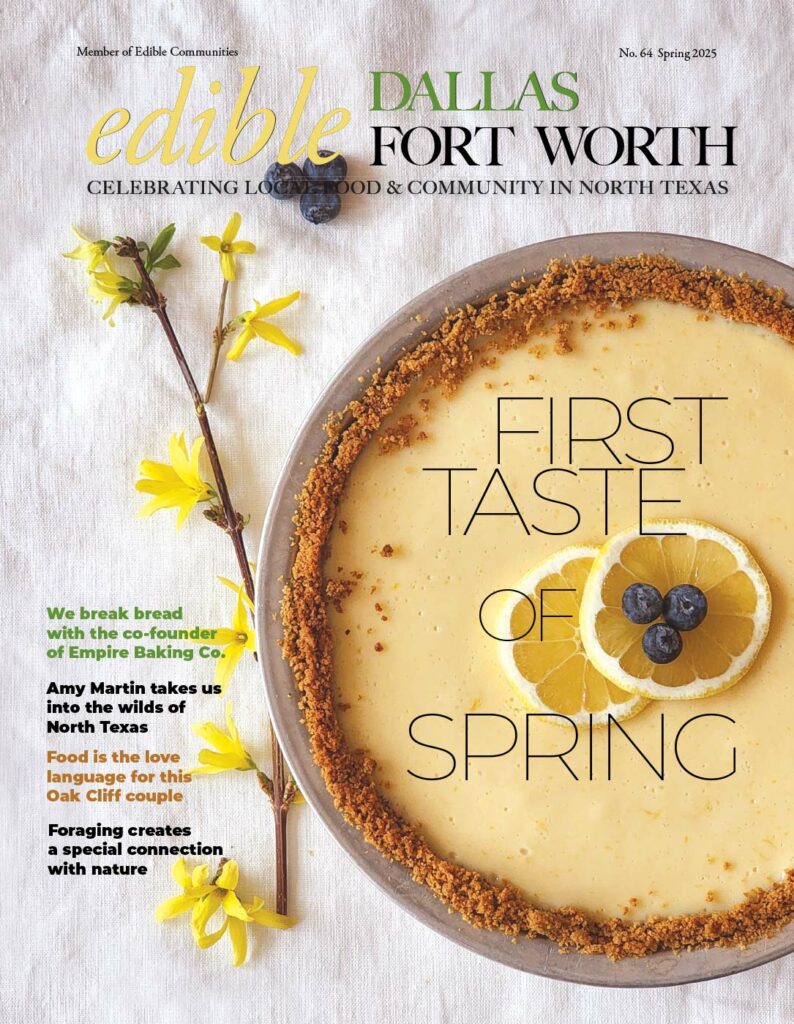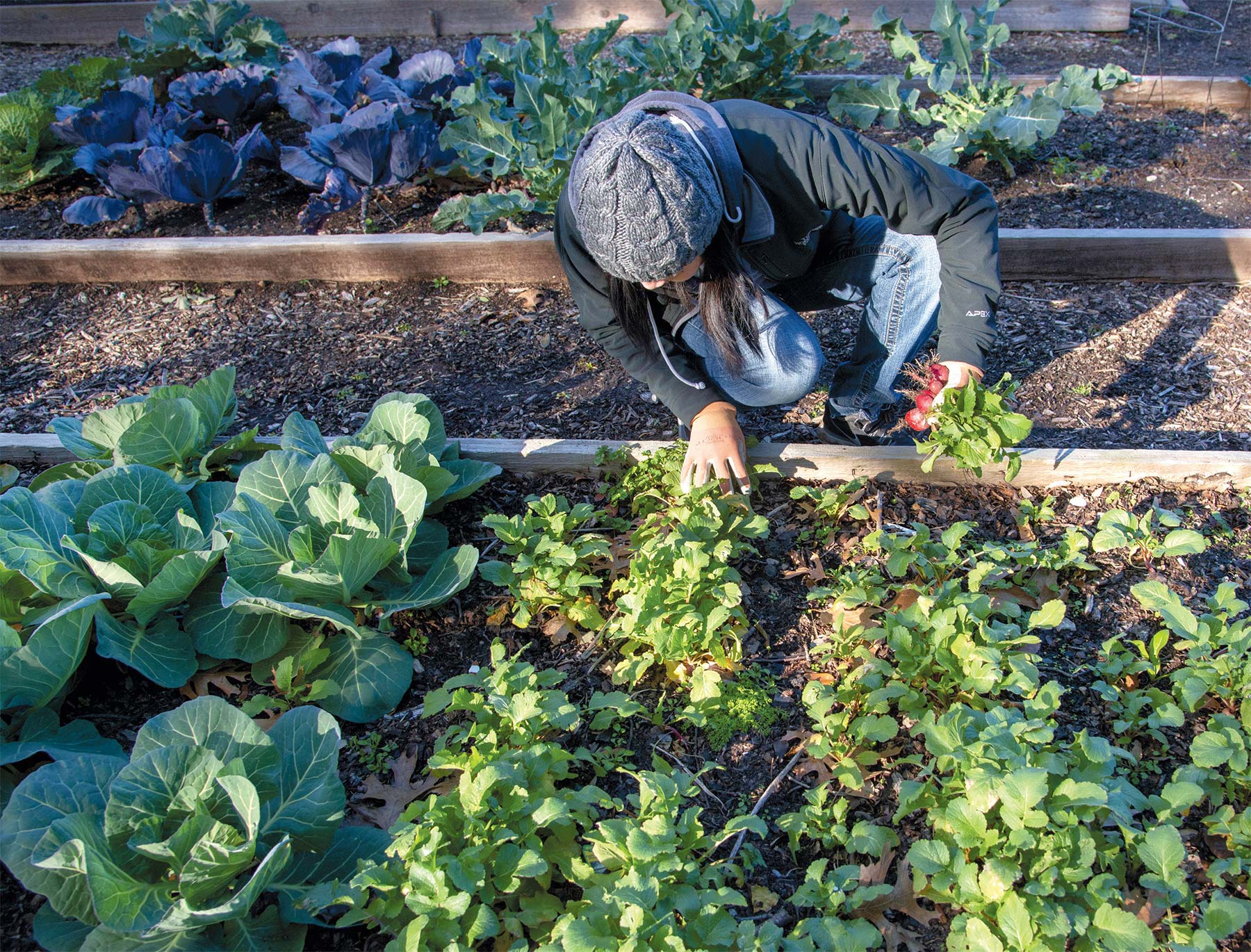
Roni Gunther pushes her fingers down into the loose soil and pulls. Up comes a handful of ruby red radishes. Other volunteers dig up turnips. Green and purple cabbages are cut from the ground and weighed. It is a bountiful harvest—a harvest to be shared.
It’s early morning at Helping Hands Garden in Coppell. By noon, these organic vegetables will fill pantry bins at Metrocrest Social Services only a few miles away in Farmers Branch. A line of clients is already waiting. By dinner, fresh produce will be in their kitchens and on their tables—all thanks to the work of community gardeners.
Leaf lettuce, potatoes and tomatoes have joined peanut butter, boxed macaroni-and-cheese and canned spaghetti as standard fare at food pantries. The North Texas Food Bank has even created a training garden to teach its clients how to grow their own.
By noon, these organic vegetables will fill pantry bins at Metrocrest Social Services only a few miles away in Farmers Branch
NTFB spokesperson Anna Kurian, says that although the bulk of its produce comes from major food distributors, local gardens also provide significant amounts. From July 2017 to June 2018, the bank received 30,000 to 40,000 pounds of fresh vegetables, grown and harvested locally by community-garden volunteers.
While some community gardens rely on the North Texas Food Bank to distribute their harvest, Coppell Community Garden and others have direct relationships with a nearby pantry. Last year, Coppell provided more than 15,000 pounds of food to Metrocrest. Farmers Branch Community Gardens was another significant Metrocrest contributor. “We’re dependent on these gardens,” says Dick Schmidt, a Metrocrest food services volunteer. “Almost every client that goes through gets produce.”
Similar grow-and-share plots are springing up around the region. Onions, carrots and bok choy can be found growing behind churches, in school courtyards and on what was once unused land.
McKinney Roots grew out of the passion of two friends and a pediatrician with an abandoned baseball field. Home gardeners Michelle McCarley and Carissa Bleecker became inspired while looking for a place to donate their extra harvest. The idea was formed when a local pediatrician, who wanted his patients to eat better, offered up an old baseball diamond on rural property that he owned.
Bleecker and McCarley collected a few more friends and began McKinney Roots two years ago. They’ve been helped by schools, home-schooled kids, Girl Scouts and a bunch of others who just wanted to contribute to the community. Their harvest goes to several agencies in town, and they are working on a coalition to bring all the parties together to provide more coordination. And their garden is expanding. “We are just really passionate about it,” Bleecker says.
It is a pattern being repeated across the country. These gardens are usually the inspiration of a committed few who secure a site and start signing up volunteers. Some grow in “farmer rows”— the familiar tilled furrows—but most use raised beds. In some, volunteers work throughout the garden. In others, plots are adopted by an individual or a small group of friends. Some gardeners take home produce for themselves and donate the rest.
The Temple Emanu-El gardens in Dallas are tucked behind the main building on Hillcrest Road. There’s a small garden used by the school to help children learn about growing food and a large garden where food is grown for the Vickery Meadow Food Pantry. Last year, the gardeners donated more than 1,300 pounds.
Onions, carrots and bok choy can be found growing behind churches, in school courtyards and on what was once unused land.
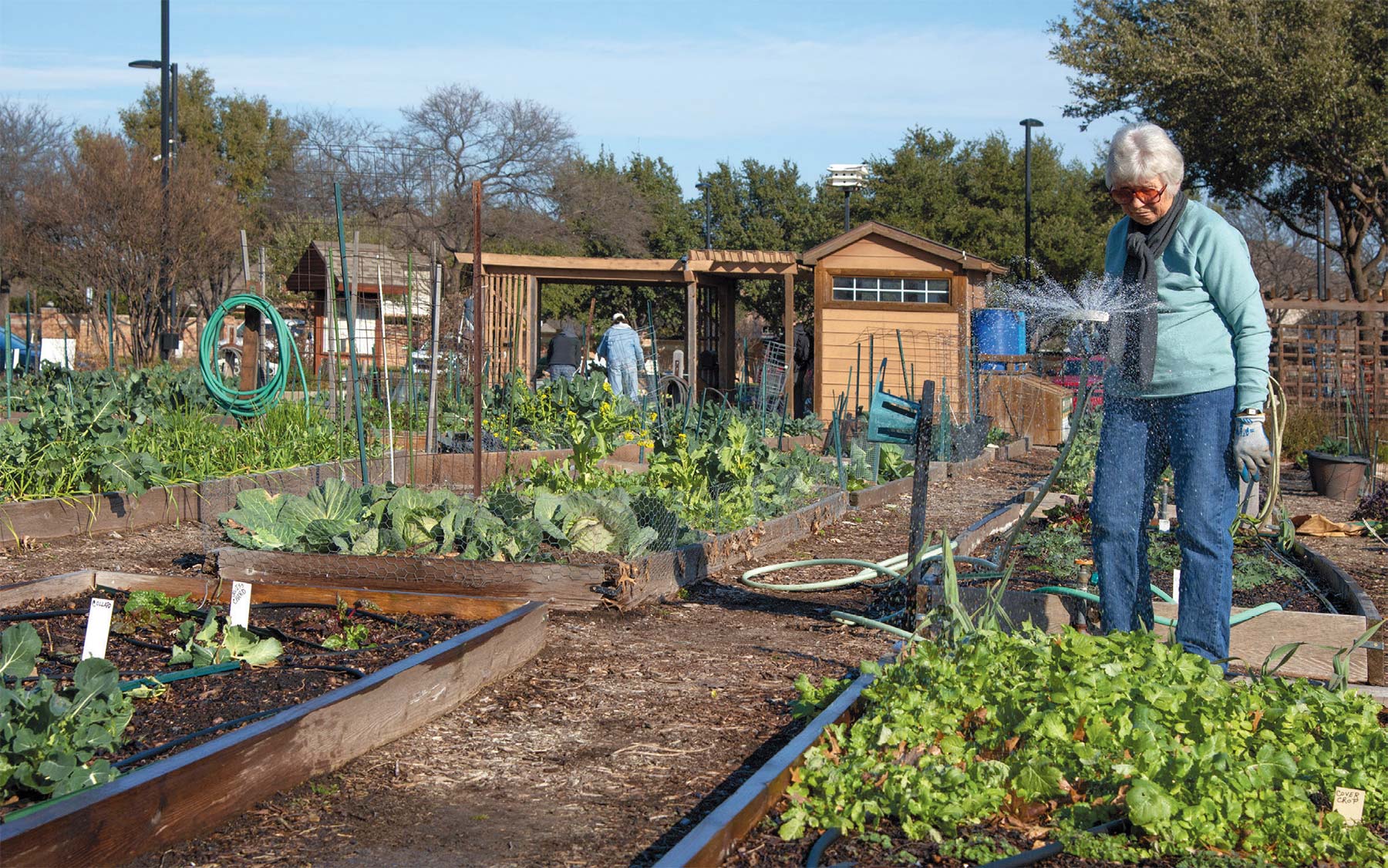
Kay McInnis, head volunteer and garden wrangler, says the garden is expanding because the need is so great. “The vegetables are just snapped up,” she says. “There is never enough to go around.” The congregation broke ground in March on the expansion, which will include a greenhouse to grow seedlings and a refrigerated building to store vegetables until they can be delivered. They hope to turn the older beds over to refugees, so they can grow their own.
Volunteers don’t always start out as expert gardeners. Many have home gardens, but others have not grown in years, if ever. Gunther began working at Helping Hands about a year ago after accidentally discovering it. She was walking her dog in Town Center when she saw the rows of raised beds.
“I didn’t even know it was here,” she says. After talking to a friend and learning more about the program, she decided to volunteer. “I thought if you can do it, why not? Why not?” She had gardened some in the past but not recently. Now, she comes most Saturdays and also during the week. “I’ve learned a lot.”
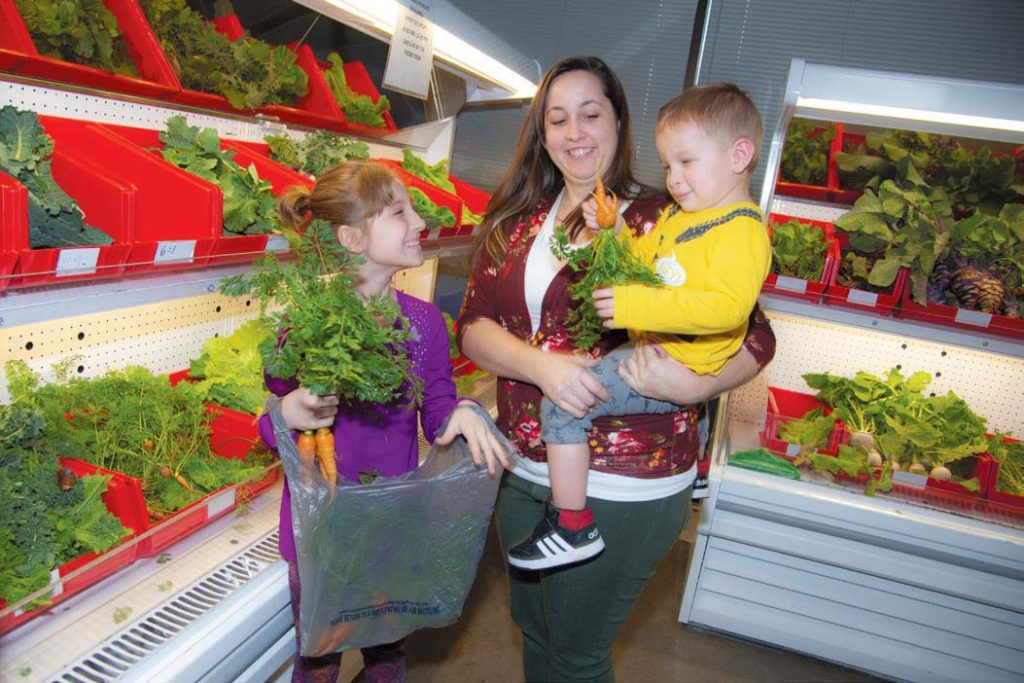
Maggie Edwards and her kids pick out carrots at Metrocrest Social Services in Farmers Branch 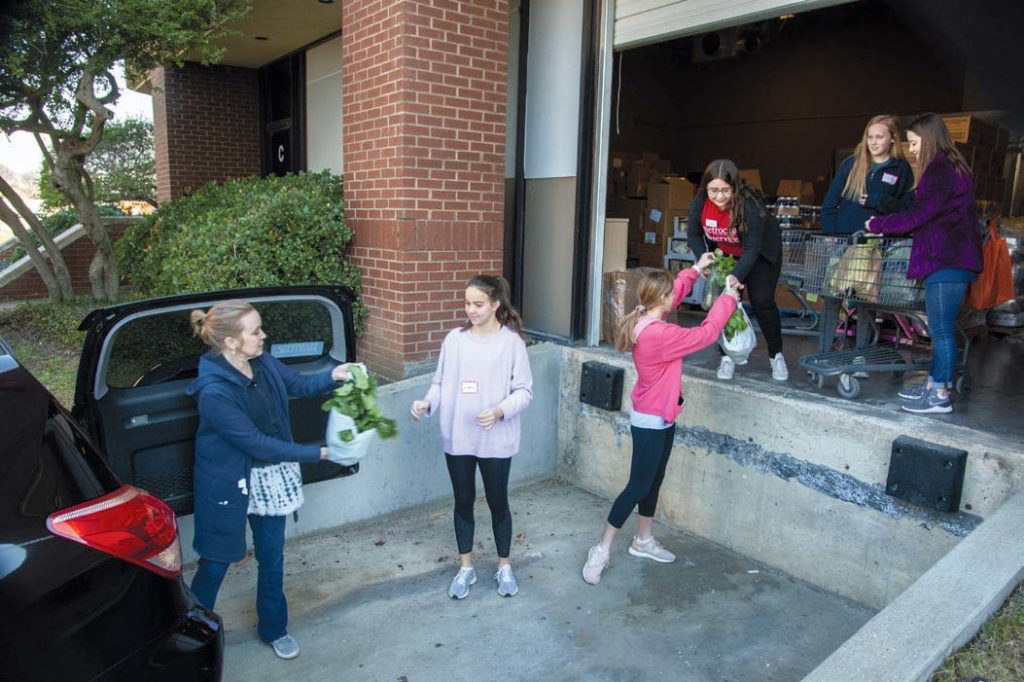
Volunteers from the National Charity League of Addison unload vegetables at Metrocrest Services. 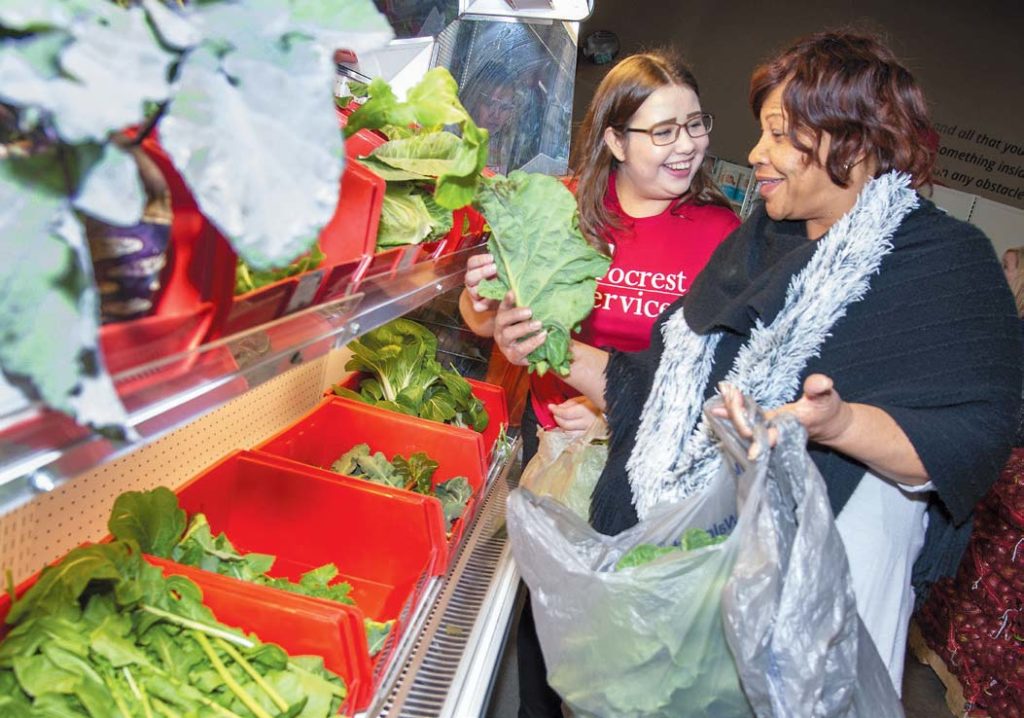
Viva Jackson gets an encouraging hand from Metrocrest pantry assistant Selena Marroquin
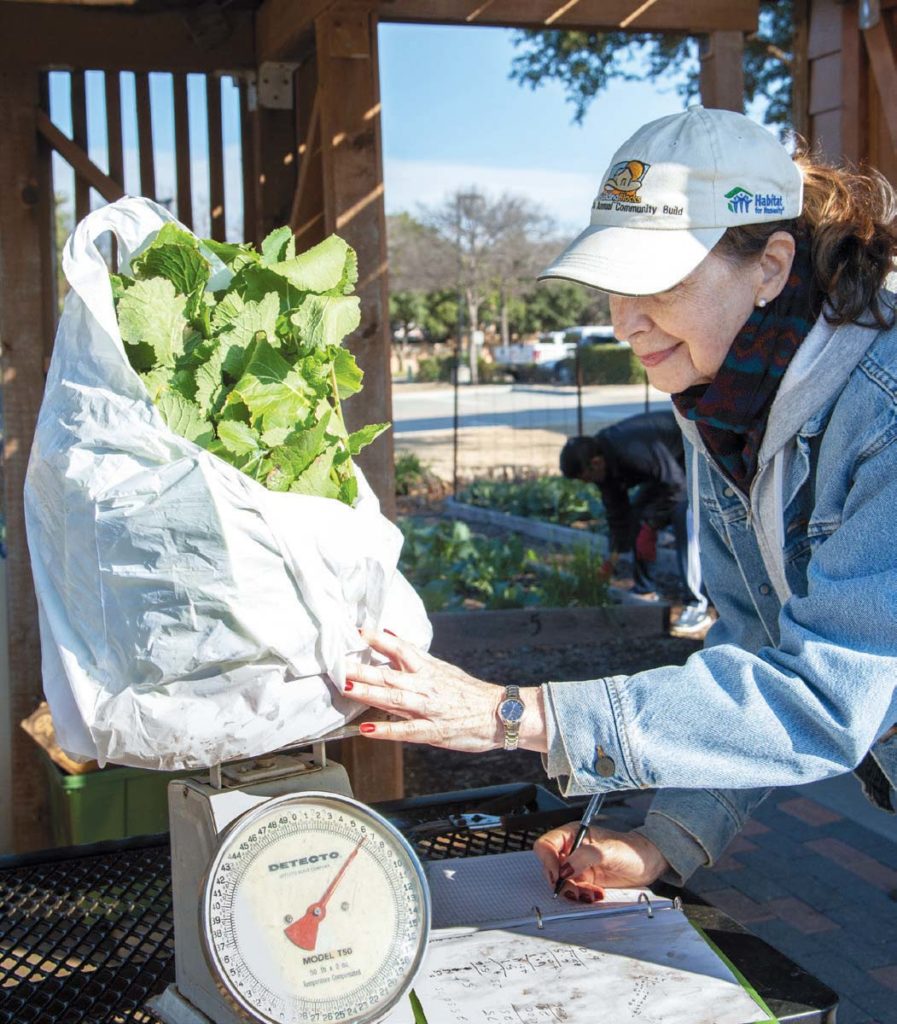
Coppell, which started their program 18 years ago, has three gardens. The largest—Ground Delivery—is next to the post office. The second garden—Old Town—is by the senior center in an older section of town. Helping Hands is the showpiece garden, says Diane Lowe, the garden manager. It blends with city hall landscaping. Herb beds surround the garden, and there is a small, brick building with a picnic table and benches. Long, neat rows with walkways between them house the vegetables. There’s not a weed in sight. “We try to make it look as nice as possible,” Lowe says.
The city started the program “because the community expressed to our city council that they wanted a way to connect,” says Molly Bujanda, Coppell community programs manager.
The city manager and council decided the site should be next to city hall for visibility and agreed to provide some financial support. A steering committee formed, and the garden took off.
Most of the money for expansion and upkeep comes from donations, corporate grants and fundraisers.
After the volunteer gardeners harvest on Saturday morning, Metrocrest volunteers pick up the produce and deliver to their pantry. “Sometimes we’ve had people lined up out the door to pick it up,” says Bev Grimley, Metrocrest’s director of special programs.
The pantry looks more like a small upscale grocery, the kind going for the warehouse look. There’s a large room with items from the North Texas Food Bank. A smaller room has coolers with eggs, almond milk and other health items. The produce donated by Coppell community gardeners is in red bins along the back wall.
Schmidt, who volunteers three days a week, says you can tell who the cooks are among their clients. “They look at the produce, and you can see the wheels turning,” he says.
Viva Jackson had not been to the pantry before. She came with her daughter one crisp Saturday and stuffed sacks with collards, mustard greens and a mystery vegetable. At first, no one could figure out the identity of the long purple bulb with purple-streaked leaves. It looked kind of like a beet with rough bark. The consensus was it was kohlrabi.
Jackson had never seen one, but up for an adventure, she took one anyway. She’d figure out how to cook it later. She says she’ll come again and “maybe donate something. You need to give back.” She likes the idea of giving food back for the food she’s receiving.
The Oak Cliff Veggie Project has turned the community garden model on its ear. To answer the need for fresh produce in a Dallas neighborhood without access to quality grocers, the group opened a free produce stand with food donated by several farms including We Over Me Farm at Paul Quinn College, Big Tex Urban Farms and Bonton Farms and the Harvest Project, which collects surplus produce from distributors.
Expanding the vision, they’re now building gardens. Neighborhood gardens were always part of the plan, says Ples Montgomery, executive director of the garden at St. Luke Presbyterian Church. He and his mother, Bettie Montgomery, started the garden about a year ago, using raised beds provided by Big Tex. They plan to expand this summer.
The mission is to help people learn to grow their own. “That’s the self-reliant part,” Montgomery says. It’s part of the group’s core values—cultivation, education and preparation. “We want to get as much food produced in the community as possible.” In March, there was a mass planting day for all gardens in Oak Cliff and West Dallas. “We wanted to help bring people together as a community,” says Montgomery. Neighbors helping neighbors.
TO VOLUNTEER OR LEARN MORE
- North Texas Food Bank
- Metrocrest Social Services
- Coppell Community Garden
- McKinney Roots
- Temple Emanu-El
- FB: The Oak Cliff Veggie Project
- Karel Hollowayhttps://www.edibledfw.com/author/kholloway/
- Karel Hollowayhttps://www.edibledfw.com/author/kholloway/
- Karel Hollowayhttps://www.edibledfw.com/author/kholloway/
- Karel Hollowayhttps://www.edibledfw.com/author/kholloway/


